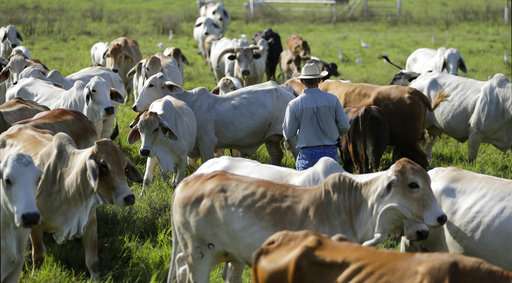Humans account for little next to plants, worms, bugs

When you weigh all life on Earth, billions of humans don't amount to much compared to trees, earthworms or even viruses. But we really know how to throw what little weight we have around, according to a first-of-its-kind global census of the footprint of life on the planet.
Humans only add up to about one ten-thousandth of the life on Earth, measured by the dry weight of the carbon that makes up the structure of all living things, also known as biomass.
The planet's real heavyweights are plants. They outweigh people by about 7,500 to 1, and make up more than 80 percent of the world's biomass, a study in Monday's Proceedings of the National Academy of Sciences said.
Bacteria are nearly 13 percent of the world's biomass. Fungi—yeast, mold and mushrooms—make up about 2 percent. These estimates aren't very exact, the real numbers could be more or less, but they give a sense of proportion, said study lead author Ron Milo, a biologist at the Weizmann Institute of Science in Israel.
"The fact that the biomass of fungi exceeds that of all animals sort of puts us in our place," said Harvard evolutionary biology professor James Hanken, who wasn't part of the study.
Still, humans have an outsized influence on its more massive fellow creatures. Since civilization started, humans helped cut the total weight of plants by half and wild mammals by 85 percent, the study said.

Now domesticated cattle and pigs outweigh all wild mammals by 14 to 1, while the world's chickens are triple the weight of all the wild birds. Instead of children's books about elephants and lions, a more honest representation of Earth's animals would be "a cow next to another cow, next to another cow next to a chicken," Milo said.
Milo and colleagues took earlier research that looked at biomass for different types of life, combined them, factored in climate, geography and other environmental issues, to come up with a planetwide look at the scale of life on the planet. Taking water out of the equation and measuring only dry carbon makes it easier for scientists to compare species. About one-sixth the weight of a human is dry carbon. Humans are about two-thirds water.
"Even though short in numbers, we have managed to throw a lot of sand in the air and mess up a lot of things," said noted Harvard biologist E.O. Wilson, who wasn't involved in the study.
More information: Yinon M. Bar-On el al., "The biomass distribution on Earth," PNAS (2018). www.pnas.org/cgi/doi/10.1073/pnas.1711842115
Journal information: Proceedings of the National Academy of Sciences
© 2018 The Associated Press. All rights reserved.





















